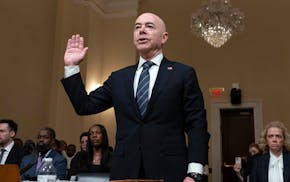The Hiawatha light-rail line may be popular with riders, but the Twin Cities' first rail transit project is on John McCain's list of political pork.
Democrat Martin Sabo, the longtime Minneapolis congressman now retired, had delivered $120 million in federal earmarks for the $715 million transit project by the 2001 groundbreaking.
But three months earlier, McCain rose in the Senate to excoriate Sabo's latest $50 million earmark for the Hiawatha line as one of many comprising "one of the most gluttonous, pork-driven, self-serving spending agendas we've seen yet."
McCain, who accepted the Republican Party's presidential nomination this week, rose to prominence as a critic of pork and earmarks, a politically popular position. But now Democrats hoping to make political hay cite a half-dozen examples of Minnesota earmarks he's opposed. Their Republican National Convention counter-spin website this week highlighted some of his jabs.
They include his erroneous claim that a big agricultural cooperative was reaping millions in federal farm subsidies, his criticism of funding for a science and engineering building at the University of St. Thomas and his questioning of seed money for a pilot program providing affordable health insurance to farmers.
Yet those who have benefited from earmarks say there's another side. Elwyn Tinklenberg, now running for Congress as a DFLer in the Sixth District, was state commissioner of transportation when ground was broken for Hiawatha.
"There are good earmarks, and there are bad earmarks," Tinklenberg said. He said the key distinction is how thoroughly potential earmarks have been vetted, as opposed to merely reflecting the pet priorities of a Congress member or lobbyist.
McCain was one of only 18 members of Congress who abstained from any earmarking of 2008 appropriations bills.
'We keep not a single cent'
One of McCain's attacks on earmarks turns out to be misleading. In a 2002 farm bill debate, he claimed that CHS Inc., a food and energy cooperative based in Inver Grove Heights, garnered $16 million in public wheat and corn subsidies.
Not so, said company spokeswoman Lani Jordan. The company merely has long served as the pass-through agent for federal payments to farmers, saving federal administrative costs.
"We keep not a single cent," she said. "I spend a lot of time trying to correct the idea that we're the largest recipient of farm payments in the universe."
St. Thomas did get the $15.5 million it sought, and which McCain highlighted in 1992 remarks: "I think the American people deserve an explanation of why these specific institutions deserve taxpayer money without competition, review by their academic peers, or detailed justification."
University spokesman Doug Hennes said the earmark paid for about 40 percent of the Frey Science and Engineering Center.
The university had gone to Sabo, a senior member in the House appropriations process. "We went through all the channels that people go through to get earmarks," Hennes said, including a mandated federal peer review. The university argued that more scientists and engineers would be good for the region, producing more research, Hennes said.
Also benefiting from an earmark that McCain criticized were twin cooperative associations in Minnesota and Wisconsin that are piloting programs for affordable health insurance for farmers and allied workers. Each group got about $2.2 million in seed money. Bill Oemichen, the president for both associations, said high premiums for scanty health coverage is driving workers off farms.
"I don't know if I want to get into the politics. I understand why Sen. McCain is concerned about the earmarks, but we're at least as meritorious as the other earmarks," Oemichen said.
Steve Brandt • 612-673-4438
New Black congressional district in Louisiana bows to politics, not race, backers say
Trump trial jury selection process follows a familiar pattern with an unpredictable outcome
Climate change concerns grow, but few think Biden's climate law will help, AP-NORC poll finds
